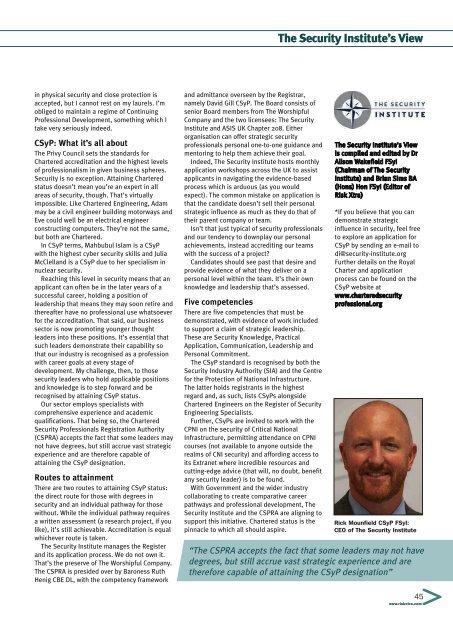RiskXtraJune2019
You also want an ePaper? Increase the reach of your titles
YUMPU automatically turns print PDFs into web optimized ePapers that Google loves.
The Security Institute’s View<br />
in physical security and close protection is<br />
accepted, but I cannot rest on my laurels. I’m<br />
obliged to maintain a regime of Continuing<br />
Professional Development, something which I<br />
take very seriously indeed.<br />
CSyP: What it’s all about<br />
The Privy Council sets the standards for<br />
Chartered accreditation and the highest levels<br />
of professionalism in given business spheres.<br />
Security is no exception. Attaining Chartered<br />
status doesn’t mean you’re an expert in all<br />
areas of security, though. That’s virtually<br />
impossible. Like Chartered Engineering, Adam<br />
may be a civil engineer building motorways and<br />
Eve could well be an electrical engineer<br />
constructing computers. They’re not the same,<br />
but both are Chartered.<br />
In CSyP terms, Mahbubul Islam is a CSyP<br />
with the highest cyber security skills and Julia<br />
McClelland is a CSyP due to her specialism in<br />
nuclear security.<br />
Reaching this level in security means that an<br />
applicant can often be in the later years of a<br />
successful career, holding a position of<br />
leadership that means they may soon retire and<br />
thereafter have no professional use whatsoever<br />
for the accreditation. That said, our business<br />
sector is now promoting younger thought<br />
leaders into these positions. It’s essential that<br />
such leaders demonstrate their capability so<br />
that our industry is recognised as a profession<br />
with career goals at every stage of<br />
development. My challenge, then, to those<br />
security leaders who hold applicable positions<br />
and knowledge is to step forward and be<br />
recognised by attaining CSyP status.<br />
Our sector employs specialists with<br />
comprehensive experience and academic<br />
qualifications. That being so, the Chartered<br />
Security Professionals Registration Authority<br />
(CSPRA) accepts the fact that some leaders may<br />
not have degrees, but still accrue vast strategic<br />
experience and are therefore capable of<br />
attaining the CSyP designation.<br />
Routes to attainment<br />
There are two routes to attaining CSyP status:<br />
the direct route for those with degrees in<br />
security and an individual pathway for those<br />
without. While the individual pathway requires<br />
a written assessment (a research project, if you<br />
like), it’s still achievable. Accreditation is equal<br />
whichever route is taken.<br />
The Security Institute manages the Register<br />
and its application process. We do not own it.<br />
That’s the preserve of The Worshipful Company.<br />
The CSPRA is presided over by Baroness Ruth<br />
Henig CBE DL, with the competency framework<br />
and admittance overseen by the Registrar,<br />
namely David Gill CSyP. The Board consists of<br />
senior Board members from The Worshipful<br />
Company and the two licensees: The Security<br />
Institute and ASIS UK Chapter 208. Either<br />
organisation can offer strategic security<br />
professionals personal one-to-one guidance and<br />
mentoring to help them achieve their goal.<br />
Indeed, The Security Institute hosts monthly<br />
application workshops across the UK to assist<br />
applicants in navigating the evidence-based<br />
process which is arduous (as you would<br />
expect). The common mistake on application is<br />
that the candidate doesn’t sell their personal<br />
strategic influence as much as they do that of<br />
their parent company or team.<br />
Isn’t that just typical of security professionals<br />
and our tendency to downplay our personal<br />
achievements, instead accrediting our teams<br />
with the success of a project?<br />
Candidates should see past that desire and<br />
provide evidence of what they deliver on a<br />
personal level within the team. It’s their own<br />
knowledge and leadership that’s assessed.<br />
Five competencies<br />
There are five competencies that must be<br />
demonstrated, with evidence of work included<br />
to support a claim of strategic leadership.<br />
These are Security Knowledge, Practical<br />
Application, Communication, Leadership and<br />
Personal Commitment.<br />
The CSyP standard is recognised by both the<br />
Security Industry Authority (SIA) and the Centre<br />
for the Protection of National Infrastructure.<br />
The latter holds registrants in the highest<br />
regard and, as such, lists CSyPs alongside<br />
Chartered Engineers on the Register of Security<br />
Engineering Specialists.<br />
Further, CSyPs are invited to work with the<br />
CPNI on the security of Critical National<br />
Infrastructure, permitting attendance on CPNI<br />
courses (not available to anyone outside the<br />
realms of CNI security) and affording access to<br />
its Extranet where incredible resources and<br />
cutting-edge advice (that will, no doubt, benefit<br />
any security leader) is to be found.<br />
With Government and the wider industry<br />
collaborating to create comparative career<br />
pathways and professional development, The<br />
Security Institute and the CSPRA are aligning to<br />
support this initiative. Chartered status is the<br />
pinnacle to which all should aspire.<br />
The Security Institute’s View<br />
is compiled and edited by Dr<br />
Alison Wakefield FSyI<br />
(Chairman of The Security<br />
Institute) and Brian Sims BA<br />
(Hons) Hon FSyI (Editor of<br />
Risk Xtra)<br />
*If you believe that you can<br />
demonstrate strategic<br />
influence in security, feel free<br />
to explore an application for<br />
CSyP by sending an e-mail to<br />
di@security-institute.org<br />
Further details on the Royal<br />
Charter and application<br />
process can be found on the<br />
CSyP website at<br />
www.charteredsecurity<br />
professional.org<br />
Rick Mounfield CSyP FSyI:<br />
CEO of The Security Institute<br />
“The CSPRA accepts the fact that some leaders may not have<br />
degrees, but still accrue vast strategic experience and are<br />
therefore capable of attaining the CSyP designation”<br />
45<br />
www.riskxtra.com>
















